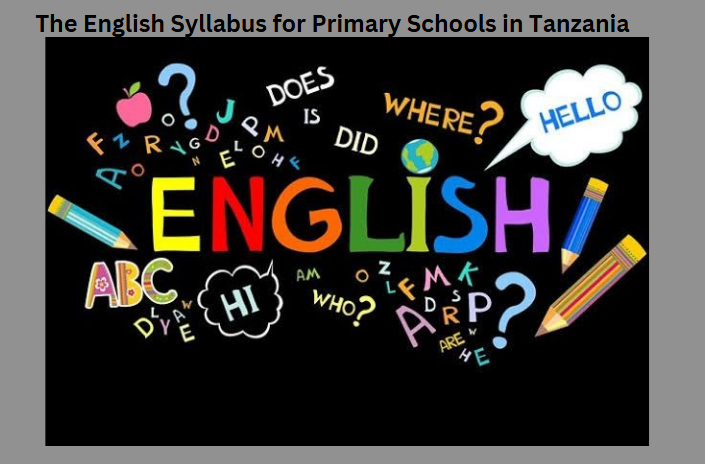The English Syllabus for Primary Schools in Tanzania; In Tanzania, the English language is an essential part of the education system. It is a subject that students start learning from a very young age, and it plays an important role in their overall academic and personal development.
The English syllabus for primary schools in Tanzania is designed to help students learn the language in a gradual, systematic way.
This post will explore the primary school English syllabus in Tanzania, its key objectives, the areas of focus, and how it benefits students in their educational journey.

The Role of English in Primary Education in Tanzania
English is a compulsory subject in Tanzanian primary schools. It is not only the language of instruction in secondary school and higher education but also a global language used for communication, business, and information.
Therefore, teaching English from the early stages of primary school is vital in preparing students for future academic challenges and opportunities.
The primary English syllabus is carefully crafted to ensure that students build a strong foundation in the language. It is structured to improve their reading, writing, speaking, and listening skills, and to help them develop a deeper understanding of the language.
Objectives of the English Syllabus for Primary Schools
The main goals of the English syllabus for primary schools in Tanzania are to:
- Enable Students to Communicate Effectively: The primary objective is to help students use English as a tool for communication. They learn how to speak, write, listen, and understand English in everyday situations.
- Improve Literacy Skills: The syllabus aims to improve students’ ability to read and write in English. By focusing on reading comprehension, writing practice, and vocabulary, students are equipped with the basic literacy skills needed to succeed in their academic journey.
- Prepare Students for Secondary School: English is the language of instruction in secondary schools in Tanzania. The primary syllabus aims to prepare students for this transition by teaching them essential language skills that will be required for their future academic success.
- Develop Critical Thinking: Through lessons in English, students are encouraged to think critically. They learn how to ask questions, understand different points of view, and express their own ideas clearly.
Structure of the English Syllabus in Primary Schools
The English syllabus for primary schools in Tanzania is divided into different levels, with each level building on the previous one. The syllabus covers students from standard one to standard seven, gradually introducing them to new concepts and skills. Below are the key areas of focus for each level:
1. Standard 1 (Grade 1)
In Standard 1, students are introduced to basic English language concepts. They start by learning the alphabet, simple words, and basic vocabulary related to everyday life. The focus is on listening and speaking skills, with students practicing simple greetings, introductions, and basic conversations.
- Reading: Students learn to recognize letters, understand simple words, and start to read short sentences.
- Writing: Students practice writing simple words and letters.
- Speaking: They are encouraged to speak in simple English sentences, including greetings like “Hello,” “How are you?” and “What is your name?”
- Listening: Students are trained to listen to simple instructions and respond appropriately.
2. Standard 2 (Grade 2)
In Standard 2, students build on their basic knowledge of English. They learn more vocabulary and begin to form simple sentences. The emphasis is on improving speaking and listening skills and expanding vocabulary.
- Reading: Students read simple stories and poems, which help them improve their reading comprehension.
- Writing: They begin to write simple sentences using basic grammar and punctuation.
- Speaking: Students engage in short conversations and express their thoughts in complete sentences.
- Listening: Students listen to short stories and instructions, answering questions to show comprehension.
3. Standard 3 (Grade 3)
At this level, students begin to understand more complex sentence structures and grammar. They start to read longer passages and write more detailed sentences.
- Reading: Students read simple paragraphs and start to identify the main idea of a text.
- Writing: They practice writing short paragraphs about familiar topics, such as their family or school.
- Speaking: Students begin to express their ideas in simple paragraphs.
- Listening: They continue to practice listening to short stories or instructions and answering questions based on the content.
4. Standard 4 (Grade 4)
In Standard 4, students’ skills continue to develop. They are expected to engage in more complex conversations and read longer texts. They also begin to learn basic grammar rules.
- Reading: Students read longer stories, articles, or passages and identify key details and meanings.
- Writing: They write short essays and simple reports, expressing ideas in a clear and organized way.
- Speaking: Students practice speaking about their opinions on simple topics and engage in role-playing activities.
- Listening: Listening exercises focus on understanding longer conversations and stories, and students practice responding to questions.
5. Standard 5 (Grade 5)
In Standard 5, students work on improving their writing and reading comprehension skills. They start learning about tenses, parts of speech, and punctuation in more detail.
- Reading: Students read a variety of texts, such as stories, advertisements, and instructions, and answer questions to test comprehension.
- Writing: They write letters, simple essays, and stories with proper grammar and structure.
- Speaking: Students engage in conversations about everyday topics and practice presenting information to the class.
- Listening: Listening activities include understanding conversations in different contexts and identifying important details.
6. Standard 6 (Grade 6)
At this stage, students are expected to demonstrate a higher level of proficiency in English. They focus on writing detailed essays and improving their grammar skills.
- Reading: Students read more complex texts and analyze their content.
- Writing: They write longer essays, using paragraphs and correct punctuation.
- Speaking: Students participate in discussions and debates on various topics.
- Listening: They listen to longer stories, instructions, or discussions and provide detailed responses.
7. Standard 7 (Grade 7)
In the final year of primary school, students are expected to be proficient in all aspects of the English language. The focus is on refining their skills to prepare for secondary school.
- Reading: Students read long passages, articles, or books, and analyze the content in depth.
- Writing: They write essays, letters, and creative stories, demonstrating correct grammar and style.
- Speaking: Students give presentations and speeches on various topics, demonstrating confidence in using English.
- Listening: Listening exercises involve understanding and responding to complex instructions, stories, or discussions.
Benefits of Learning English in Primary School
- Academic Success: A strong foundation in English helps students succeed in secondary school, where English is the language of instruction. It ensures they can understand their lessons, participate in class discussions, and perform well in exams.
- Better Communication Skills: Learning English from an early age helps students develop strong communication skills. It allows them to express themselves clearly and confidently in both written and spoken English.
- Access to Global Information: English is the most widely used language for international communication, and it opens up access to a wealth of knowledge, including books, research, and online resources.
- Opportunities for the Future: Proficiency in English increases students’ chances of gaining scholarships, participating in international programs, and securing good jobs in the future.
Conclusion
The English syllabus for primary schools in Tanzania plays an essential role in developing students’ language skills and preparing them for future academic and professional success.
By focusing on listening, speaking, reading, and writing, students gain a strong foundation in English that will serve them well in secondary school and beyond.
While the syllabus presents challenges, the benefits of learning English early on are immense, opening doors to greater opportunities and better communication skills. With the right support from teachers and parents, students can excel in English and become confident users of the language.
Related articles
- Science Subject in the Tanzanian Syllabus: Building Foundations for Innovation
- Science Subject in Tanzania: An Overview
- Mathematics Syllabus for Primary School in Tanzania-elimuhuru
- History of Mathematics in Tanzania-elimuhuru
- Top 10 Best Private Secondary Schools in Tanzania-Elimuhuru
- Top 50 Best Secondary Schools in Tanzania-Elimuhuru
- Education system in tanzania 2024-Elimuhuru
- Tanzania Education Statistics-Elimuhuru
- Scholarships in Tanzanian Universities-Elimuhuru
- Tanzania school fees: A Guide for Parents and Students
- International School of Tanganyika Fees-Elimuhuru
- Ahmes Secondary School Fees-Elimuhuru


